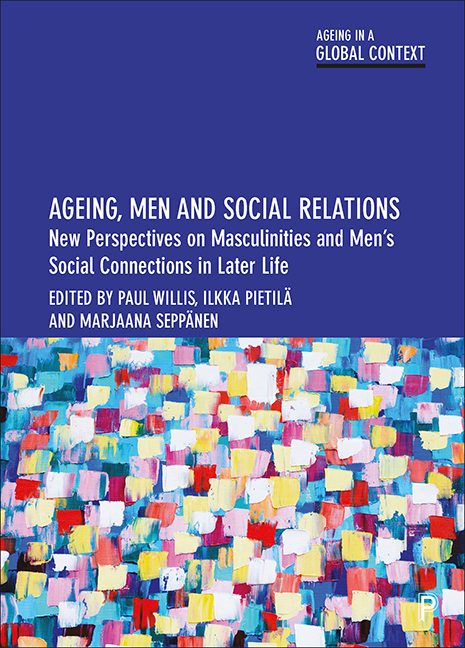 Ageing, Men and Social Relations
Ageing, Men and Social Relations Book contents
9 - The social world of dying older men: between autonomy and ‘bad deaths’
Published online by Cambridge University Press: 18 January 2024
Summary
Introduction
The aim of this chapter is to critically examine dominating points of departures and perspectives within the social science literature which addresses issues of masculine identities, autonomy and social relations among dying older men. The literature and arguments that we present in this chapter relate mainly to men involved in heterosexual relationships. Throughout the chapter we will highlight identified complexities when studying death and dying of older men, neglected perspectives and potentials for future research on these issues.
It is argued that understandings of ‘good deaths’ in contemporary Western societies are associated with dying at home and being surrounded by others, and failing these expectations is viewed as personal and societal failure (Seale, 2004). Kellehear (2009) has, however, raised the question if dying alone could be seen as a way of exercising agency among older people. Moreover, death and dying are commonly viewed as ‘the great leveller’ (Broom, 2012), as the equaliser of inequalities and differences. One context where dying persons are cared for is within palliative care, within which it is argued that there are several normative ideals of a ‘good death’, with stages that the dying person preferably should undergo (McNamara, 2004; Zimmermann, 2012). Nevertheless, the individual’s biography and gender are reproduced during the dying process and when death occurs (Field et al, 1997). Furthermore, gender has a significant influence on preferences, experiences and care received at the end of life (Gott et al, 2020). Gott et al (2020) suggest that future intersectional perspectives in research can highlight the connections between gender and age in relation to palliative care. But issues of death and dying are argued to be seldom addressed in relation to ageing and older people (Kearl, 1996; Hallberg, 2004). Palliative care is paradoxically a case in point as it was developed for, and is still claimed to be aimed at, ‘non old’ cancer patients (Gott et al, 2008; Borgstrom and Walter, 2015) and still functions as an articulation of what constitutes a good death.
On the other hand, research focusing on masculinities has mainly focused on younger men (Moss and Moss, 2007).
- Type
- Chapter
- Information
- Ageing, Men and Social RelationsNew Perspectives on Masculinities and Men's Social Connections in Later Life, pp. 139 - 152Publisher: Bristol University PressPrint publication year: 2023
